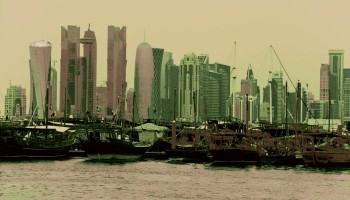Three years after blacklisting him, the United Kingdom has lifted sanctions on Slobodan Tešić, one of the Balkans’ most powerful arms dealers, Serbian investigative outlet KRIK reported.
Tešić remains under U.S. sanctions imposed in 2017 for alleged corruption and illegal arms deals. The British government did not disclose why it removed the restrictions against him last week.
The arms dealer was added to the U.K. sanctions list in December 2022 for allegedly bribing Bosnian officials, including the late chief prosecutor Milorad Barašanin and former security minister Selmo Cikotić. The longtime arms broker has denied the accusations, calling them part of a “smear campaign” and claiming the sanctions were unjustified.
Despite years under international sanctions, Tešić has continued to operate in the arms trade, aided in part by political connections. In 2020, KRIK reported that Tešić covertly took over a weapons company previously owned by Milorad Pušica, a senior member of Serbia’s ruling Serbian Progressive Party (SNS). Though the transfer was not recorded in official business registries, reporters say they obtained evidence confirming Tešić’s control.
Tešić has used associates to manage front companies and circumvent restrictions, according to the U.S. Treasury Department. In 2019, the U.S. expanded sanctions to include several of his alleged proxies.
His business activities have drawn scrutiny for years. In 2013, the United Nations lifted its sanctions against him after more than a decade, reportedly with help from Serbia’s then-new government. Foreign Minister Ivan Mrkić authorized the delisting and granted Tešić a diplomatic passport—a benefit usually reserved for senior officials. Mrkić also hired Tešić’s daughter at the ministry.
Tešić has claimed in interviews that his blacklisting in the U.S. stemmed from lobbying by powerful individuals in Bosnia and Herzegovina, with whom he had strained relations.
In 2023, the U.S. Treasury cited Tešić’s ties to Aleksandar Vulin, then head of Serbia’s intelligence agency BIA, when imposing sanctions on Vulin. According to the statement, Vulin facilitated the movement of Tešić’s illicit arms shipments across borders.
Despite these allegations, Tešić’s affiliated companies exported €31.5 million ($36.5 million) worth of weapons to the U.K. in 2023, even while he remained under British sanctions, according to the Balkan Investigative Reporting Network (BIRN). He also exported arms to the U.S.
Tešić has long bought weapons from Serbian state-owned factories. Whistleblower Aleksandar Obradović previously revealed that Tešić’s firm purchased weapons from the Krušik plant at preferential prices.
“I’ve spent 40 years building global contacts,” Tešić told KRIK in a rare interview. “Today, I can open doors for others and create deals. Sometimes, I can turn a small or medium company into a major one with just one call.”






